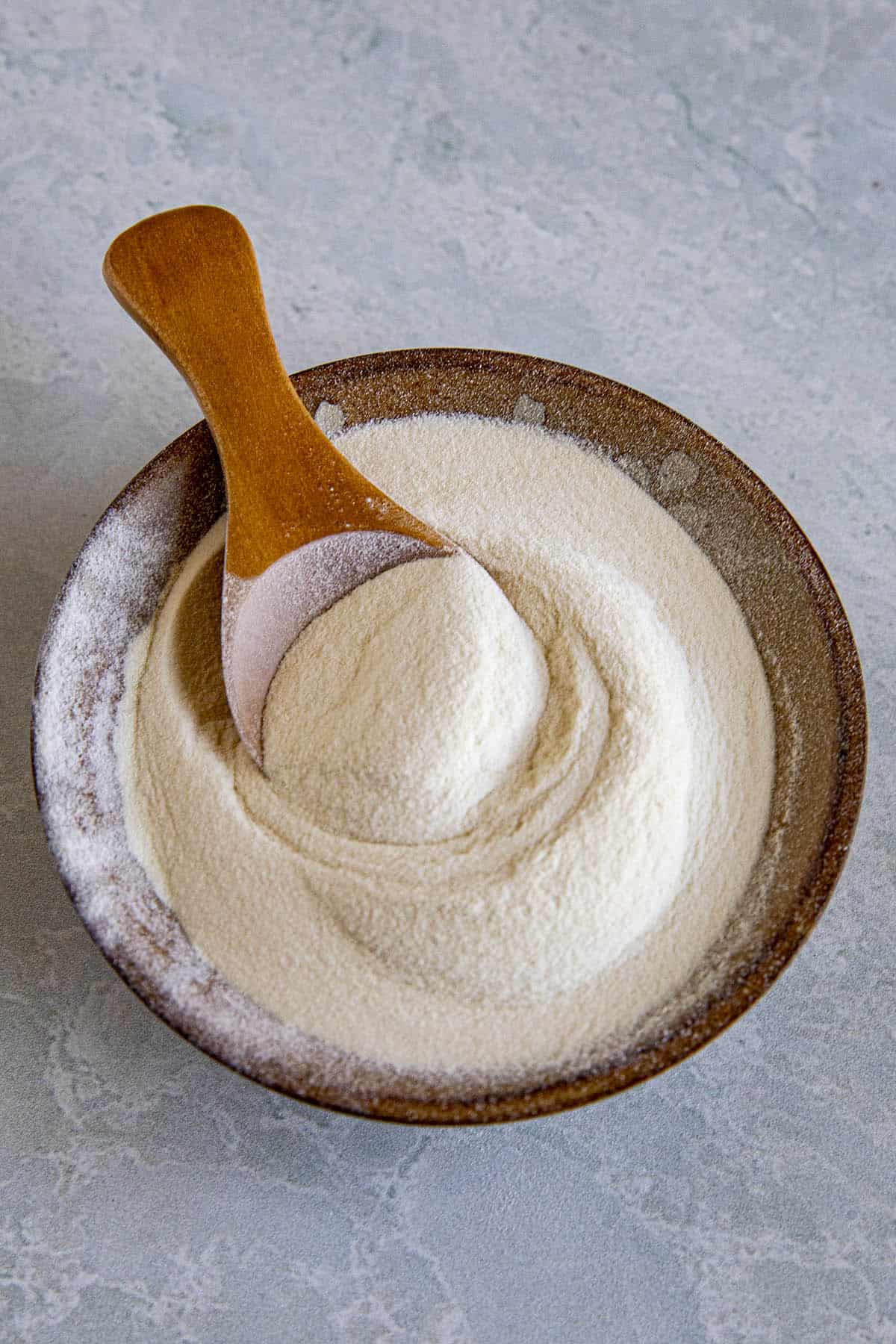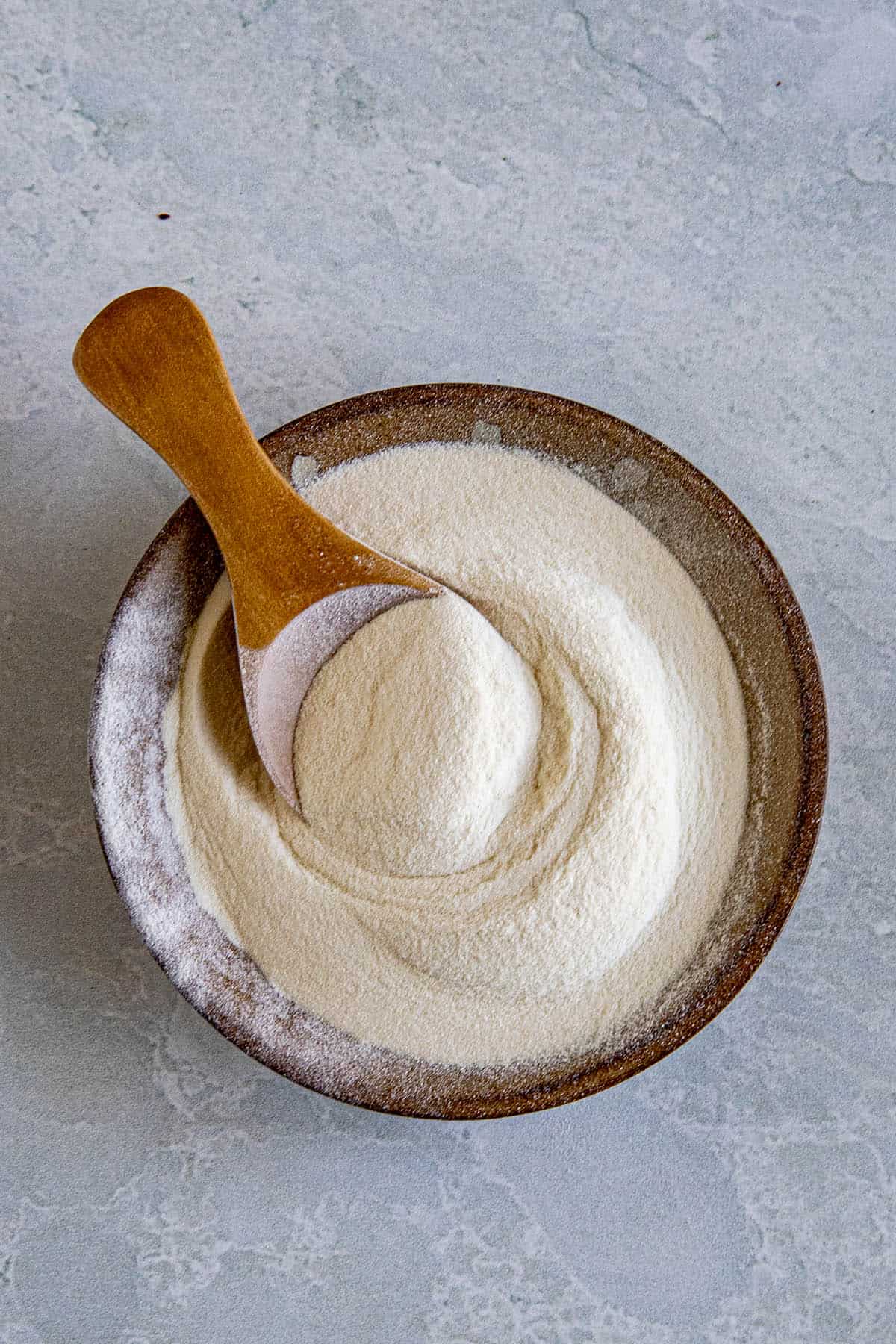Xanthan gum is a common food additive used as a thickening agent, popular as a hot sauce stabilizer to prevent separation, but it has many other uses. Learn more.

What is Xanthan Gum?
Xanthum gum is a popular thickening and stabilizing agent made from bacteria found on certain plants. It is commonly used in the food industry for its ability to thicken liquid and stabilize emulsions, as well as to enhance the creaminess of certain products.
Because of this thickening quality, it is also used in chemical or industrial applications, such as in making cosmetics or in the oil industry.
It was discovered in 1960 and allowed to be used in food products a few year later. From that time, it has been used in multiple beverages, syrups, ice creams, baked goods, toppings, sauces and hot sauces, and much more.
The process of making xanthan gum is similar to the process of making wine or cheese, from simple sugars.
The main component of the xanthan gum is bacteria found on the leaf's surface of green vegetables such as broccoli, cauliflower, cabbage, kale, turnip, and sprouts. It's name comes from the species of bacteria used to produce it - Xanthomonas Campestris.
Once the bacterium is extracted, it is fermented just like cheese and wine. After the fermentation process, it is dried and made into powder form.
The powder is then used to change the texture of the food and balance the food's thickness and texture.

How to Use Xanthum Gum to Thicken Hot Sauce
Xanthan gum acts much like gelatin when working with it. You don't need to heat it to thicken a sauce. It will begin to thicken as soon as it starts to mix with the liquid. It is best to use a blender, as it will begin to thicken immediately, and could clump up if mixing manually.
In general, use 1/8 teaspoon per cup of hot sauce to thicken the sauce. Use 1/4 teaspoon or more for a thicker hot sauce. Again, you don't need to heat the sauce for thickening, particularly when making fermented hot sauces, where you don't want to lose the probiotic benefits.
Also, Xanthan gum is a vegan product.
It is commonly used to stabilize commercial sauces to keep them from separating. While it is not an emulsifier itself, it does stabilize emulsions and mixtures, and helps keep the spices suspended in the sauce.
Other Uses for Xanthan Gum
- Treating Diabetes. Studies have shown that it may be effective for treating Diabetic patients by decreasing blood sugar levels. It may be incorporated into diabetes medications.
- Cholesterol Control. Xanthan Gum has been suggested as a preventive measure for high cholesterol. On average, consumers can expect about a 10% reduction in their cholesterol levels.
- Keeps Mouth Moist. Xanthan Gum has been widely used as a saliva substitute. It is one of the best remedies for individuals having an issue with dry mouth, which can cause difficulty in swallowing food.
- Food Thickener. Xanthan gum is a food stabilizing agent. Toothpastes and other food products manufacturers use it to maintain thickness. Moreover, it also maintains moisture, which keeps the products intact. You may find it as a basic ingredient to many food and cosmetic products.
In addition to these uses, it is also known for treating constipation and other auto-immune disorders.
Is Xanthan Gum Bad For You?
Xanthan Gum is safe, though it does have potential risks in high doses. Depending upon your condition, Xanthan Gum may not be useful for you.
Rather, it will only worsen your condition if you are suffering from gastrointestinal pain. So, do not expect any relief from a substance known for keeping moisture intact.
Furthermore, it may also become harmful for people allergic to cabbage, broccoli, and other plants in the same category.
Seed medical advice if you experience stomach pains or have specific concerns about the side effects of xanthan gum.
Does Xanthan Gum Have Carbs?
Xanthan gum does contain carbohydrates in the form of fiber which don't break down in the digestive tract, though it is gluten free. It is often used for gluten free baking to help make batters and doughs more sticky.
Xanthan Gum Substitutes
- Chia Seeds and Water. When soaked in water, Chia seeds stabilize the texture of your recipe and add a crunch factor to it.
- Ground Flax Seeds and Water. When ground flax seeds are mixed with water, the mixture acts exactly like Xanthan gum.
- Psyllium Husk. This is considered one of the best substitutes for the xanthan gum because it is also made organically from the husk of plantago ovate seeds. It acts just like xanthan gum by lowering the blood sugar and cholesterol in the body.
- Cornstarch. This is a common plant-based thickener, popular for foods like soups and gravy. Also consider arrowroot or tapioca.
- Others. Other popular substitutes include gelatin, agar agar, or egg whites, depending on your use.
Buy Xanthan Gum
I buy xanthan gum online, though you can sometimes find it in grocery stores in the baking aisle.
- Buy Xanthan Gum here (affiliate link, my friends!)
Got any questions? Drop me a line anytime.
Check out my Hot Sauce Recipes, which you can easily thicken or stabilize with this ingredient.


Diane N says
Can you suggest usage(measurement) ratios for general food thickening? TY
Michael Hultquist - Chili Pepper Madness says
Diane, use 1/8 teaspoon per cup of hot sauce to thicken slightly. You can use 1/4 teaspoon or more for a thicker sauce. I hope this helps.